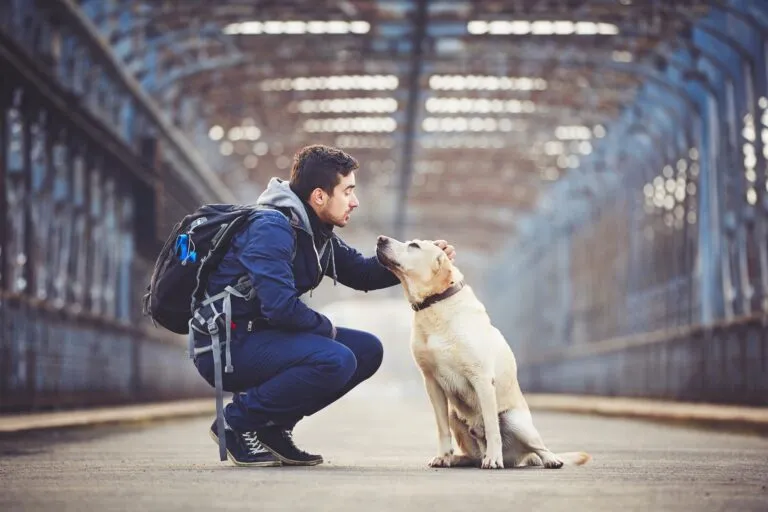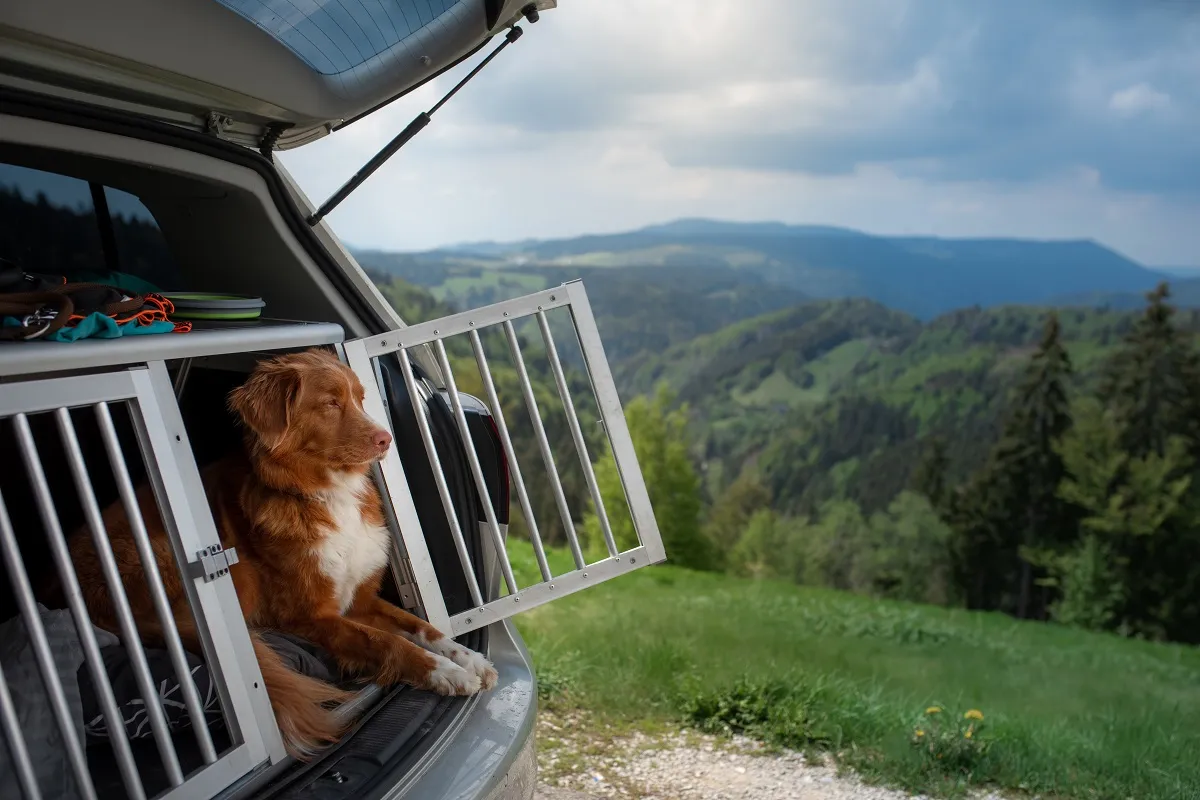Hiking with Dogs – Everyday Adventures
Be it short hikes in the surrounding area, day trips at the weekend or whole hiking holidays with your dog, hiking is a great hobby for human-canine teams!
Beach, mountain or culture? When their long-awaited holiday finally comes around, dog owners don't just have to consider a destination, but also what will happen to their beloved pet at this time. Should it be a holiday with the dog or is it better off staying at home in dog kennels or with a dogsitter? We will show you the different options and what you should pay attention to when planning.

© chalabala / stock.adobe.com
Sometimes a holiday without dogs is the better choice.
A holiday destination that satisfies both your and your dog’s needs is crucial for a holiday that both of you find fun. This isn’t always easy.
Perhaps you’re dreaming of a comfortable sun lounger at the pool and delicious cocktails. But your dog is keen on shady forests, refreshing lakes and plenty of exercise.
A hiking holiday in the mountains is certainly ideal, especially for active dogs that need plenty of exercise. Dogs that love water will fully appreciate a dog beach holiday. Furthermore, dogs aren’t popular to the same extent in all countries. You can find numerous tips for holidays and excursions with dogs in travel guides or online.

Have you found a travel destination that you, your dog and all your travel companions like? Congratulations! The first step is complete. Now you have to look for suitable local accommodation.
Be it a hotel or holiday home, dogs have to expressly be allowed. In order to avoid any nasty surprises, if in doubt you’re best off asking several times beforehand if you really can take your dog with you.
Many owners make a decision too based on the dog’s breed or size. So it’s best if you state in advance what dog you are taking with you.
If dogs are allowed, the next step is checking if there are sufficient opportunities for outdoor exercise in the surrounding area. A hotel room on the sixth floor without a balcony is not suitable. A holiday home with its own garden or at least a ground-floor holiday home with some green space by the door are certainly more recommended.
A camping holiday with a tent, caravan or mobile home during which your dog spends plenty of time outdoors is also an option. The requirement here too is of course dogs being allowed at the campsite.
In addition, there should be separate and above all shady pitches available. In the wider surroundings of your accommodation, there should also be parks, meadows, woods or beaches where your dog can get plenty of exercise.
Once you’ve found suitable accommodation for you and your dog, you have overcome the biggest obstacle. But before making a booking, you should clarify the following questions:
Depending on your flexibility, it’s recommended to choose the timing of your holiday so that temperatures aren’t too high in your destination country. Female dogs shouldn’t be in heat and moulting, which requires increased grooming, shouldn’t be underway.
Once your holiday finally comes around, you should start packing in good time. Don’t just think about sun cream, walking boots and camera, but the travel kit your dog needs too.
In addition, you should of course be prepared for minor emergencies on holiday. The following shouldn’t be missing in your first-aid kit for your dog:

Holidays without dogs? This is unimaginable for some dog lovers. But sometimes it can actually be better if your canine friend stays at home.
A long, difficult journey, strict entry requirements, risk of infection, extreme weather conditions or dogs not being allowed in hotels and on beaches often make it difficult to take your dog with you.
As well, ideas of what holidays should be like aren’t always compatible with the needs of your four-legged friend. Two weeks at the hotel pool, a week on the ski slopes or a city break with churches and museums definitely aren’t right for your dog.
You should also only put sick or very old dogs through a long journey in emergencies.
Don’t worry – you aren’t an uncaring dog parent if you want to go on holiday without your dog. On the contrary – this decision is often more sensible. In the aforementioned cases, accommodating your dog with friends, a dogsitter or in dog kennels is clearly the better choice.
However, it’s important that you plan your pet’s accommodation in good time. Be sure to look into the different canine care options. After all, you’ll only have a relaxing holiday if you know your dog is in good hands.
Naturally the ideal option is your dog being taken care of during your absence by trusted family members or friends who know your dog well and can treat it to stroking sessions and long walks.
If friends or relatives aren’t an option, you should arrange accommodation with a dogsitter or in dog kennels in good time before your holiday. You can find addresses online and from some vets, dog schools or associations.
The experiences and recommendations of other dog owners are very valuable. However, you should always take a look at dogsitters and dog kennels yourself too. After all, not all dogs are the same. Whilst one may feel very at ease in a large pack with other dogs, this may be sheer stress for others.
The criteria outlined below should be met to ensure that your dog is well at the dogsitter’s or in dog kennels.
Tip: It’s best if you check this during an announced visit. This gives you an authentic impression of the dog care provision.
You should pay special attention to the following criteria:
If all these criteria are met to your satisfaction, there’s nothing in the way of your dog staying there.
However, you should arrange a trial overnight stay to be sure that your dog copes. Only once this has gone smoothly can you be relaxed starting a dog-free holiday.
As a dog owner, you have to plan your holiday in good time and make thorough preparations. After all, you should be able to fully enjoy your holiday.
This is only possible if your dog is well cared for – regardless of whether you’re taking it with you on holiday or leaving it at home with friends, the dogsitter or in dog kennels. You should take enough time to plan your holiday, especially if you’re going away for the first time with or without your dog.
Bear in mind too that dogsitters and dog kennels, as well as hotels and holiday homes where dogs are allowed, get booked up quickly in the peak holiday season.
In general, the better prepared you are, the more straightforward travelling will be. On this note, we wish you a relaxing holiday – with or without your dog!
Here are some purchase proposals curated by the zooplus editorial team
The products featured have been carefully selected by our editorial staff and are available at the zooplus online pet shop. The selection does not constitute advertising for the mentioned brands.
Be it short hikes in the surrounding area, day trips at the weekend or whole hiking holidays with your dog, hiking is a great hobby for human-canine teams!
Dog lovers like to take their four-legged best friends everywhere with them. As long as it's just ventures within the city, it's self-explanatory that our four-legged family members go everywhere with us. But what's the situation when it comes to holidays? What are the possibilities for animal lovers when moving a long distance? Is there the opportunity to take a dog on a plane? Or is it better for dog owners to tackle long journeys by car?
Many humans are familiar with the problem: They can barely sit for a few minutes in a moving car or on a rocky ship before becoming nauseous – or travel sick. Unfortunately our four-legged friends are often affected by this too. Read in the following article everything you need to know about travel sickness in dogs.